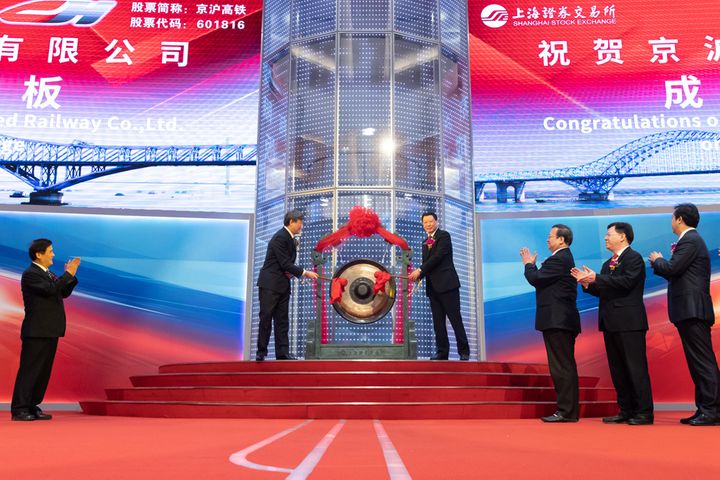 Ping An to Stick With Beijing-Shanghai Rail Operator Long Term, Executive Says
Ping An to Stick With Beijing-Shanghai Rail Operator Long Term, Executive Says(Yicai Global) Jan. 16 -- Ping An Insurance, which heads a consortium of insurers that is Beijing-Shanghai High Speed Railway's second-largest shareholder, intends to hold on to its stake in China's most profitable rail operator.
Shares of Beijing-Shanghai High Speed Railway surged today by the maximum allowed under stock exchange rules, after the firm debuted on the Shanghai market. The stock price [SHA:601816] jumped 44 percent at the opening bell, and closed 39 percent higher at CNY6.77 (98 US cents).
"Ping An Group is a long-term investor in the project," the executive from the insurer told Yicai Global. "There are no plans to reduce our holding at this time."
Founded in late 2007, Beijing-Shanghai High Speed Railway's main assets are the 1,318-kilometer high-speed rail line and stations that link China's political and financial capitals. The railroad bisects the most developed eastern region, and links the Bohai Economic Rim and the Yangtze River Delta, two of the country's main economic zones, so profits at the firm have continued to grow since the line opened in June 2011.
"With unique advantages in line and location, the Beijing-Shanghai High Speed Railway is one of the best railway assets in China," the executive said. "Ping An is therefore quite optimistic about the project's prospects."
Beijing-Shanghai High Speed Railway had net profit of CNY9.52 billion (USD1.38 billion) on revenue of CNY25 billion in the nine months through September, according to the Beijing-based company's initial public offering prospectus. Its IPO pricing gave a price-earnings ratio of 23.39 times.
The consortium of seven insurance companies, which also includes People's Insurance Company of China, China Pacific Insurance and Taikang Insurance Group, invested CNY16 billion into the rail operator in 2008, when the project was just approved.
Tidy Profit
Beijing-Shanghai High Speed Railway's initial offering price of CNY4.88 (70 US cents) a share has earned the insurers a nearly 50 percent floating profit, based on a holding cost of CNY3.266 per share calculated and their investment. Also, its cumulative dividend is considerable.
Still, in the 11 years of investing in Beijing-Shanghai High Speed Railway, there has also been a stock-retreat dispute between the consortium and the project.
People familiar with the project told Yicai Global that there was uncertainty in the early stages because of the project's cost, long construction cycle and high-tech requirements. In addition to avoiding risks with transaction structure design, the insurance capital also paid close attention to the amount of investment, corporate governance and management and policy development.
In early 2013, more than a year after the opening of the high-speed railway in 2011, rumors surfaced that the insurance consortium planned to withdraw its investments in the project and had asked the Ministry of Railways to buy back its shares. According to media reports at the time, it was the lack of management transparency, return of investment and other problems that had caused dissatisfaction at the consortium.
The alleged stock-retreat dispute was gradually settled as the high-speed railway started to make profits in the following years. The railway operator's revenues were up to CNY29.6 billion in 2017 from CNY18.2 billion in 2013, an almost 13 percent compound annual growth, according to data disclosed by Beijing-Shanghai High Speed Railway. Its profit margin shifted from -42.9 percent as net profit rose to CNY12.7 billion from a CNY1.29 billion loss over the same period.
Sound Project
Executives at the insurance firms and asset managers involved in the project all agreed that the high-speed rail project is very good.
"Aside from past management problems, the project itself is well worth investing in," said one executive from an insurance and asset management company involved in the investment. "After all, there is huge passenger traffic, and its business performance has also been quite sound in recent years, turning losses into gains in only a few years."
The Beijing to Shanghai link has run safely for more than eight years and carried over 1.1 billion passengers. More than 40 pairs of high-speed trains sprint the line in 4.5 hours each day, with a one-way second class ticket costs CNY553 (USD80). In September 2017, it became the world's fastest commercial line, topping out at 350 kilometers an hour.
Editor: Peter Thomas